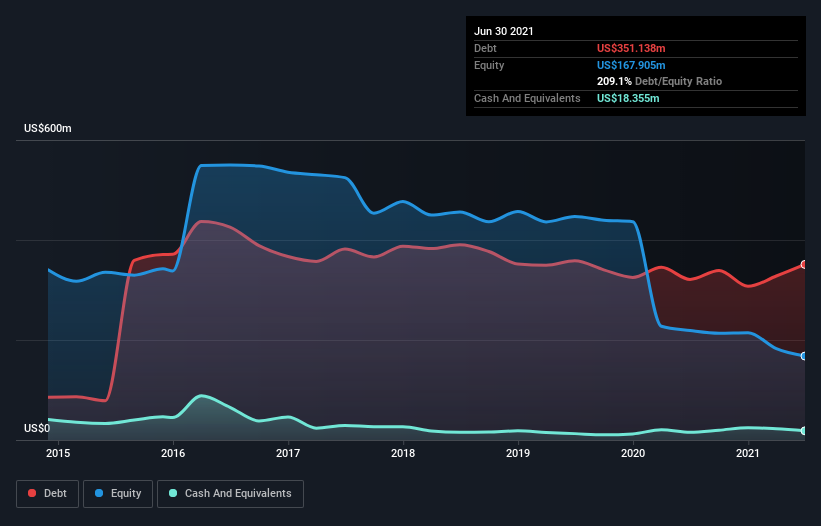- United States
- /
- Commercial Services
- /
- NYSE:TISI
Team (NYSE:TISI) Has Debt But No Earnings; Should You Worry?

Some say volatility, rather than debt, is the best way to think about risk as an investor, but Warren Buffett famously said that 'Volatility is far from synonymous with risk.' So it seems the smart money knows that debt - which is usually involved in bankruptcies - is a very important factor, when you assess how risky a company is. We note that Team, Inc. (NYSE:TISI) does have debt on its balance sheet. But the more important question is: how much risk is that debt creating?
When Is Debt A Problem?
Debt and other liabilities become risky for a business when it cannot easily fulfill those obligations, either with free cash flow or by raising capital at an attractive price. If things get really bad, the lenders can take control of the business. While that is not too common, we often do see indebted companies permanently diluting shareholders because lenders force them to raise capital at a distressed price. Of course, plenty of companies use debt to fund growth, without any negative consequences. The first step when considering a company's debt levels is to consider its cash and debt together.
View our latest analysis for Team
What Is Team's Debt?
The image below, which you can click on for greater detail, shows that at June 2021 Team had debt of US$351.1m, up from US$321.1m in one year. On the flip side, it has US$18.4m in cash leading to net debt of about US$332.8m.

How Healthy Is Team's Balance Sheet?
According to the last reported balance sheet, Team had liabilities of US$215.3m due within 12 months, and liabilities of US$423.2m due beyond 12 months. Offsetting this, it had US$18.4m in cash and US$295.7m in receivables that were due within 12 months. So it has liabilities totalling US$324.4m more than its cash and near-term receivables, combined.
This deficit casts a shadow over the US$105.0m company, like a colossus towering over mere mortals. So we definitely think shareholders need to watch this one closely. After all, Team would likely require a major re-capitalisation if it had to pay its creditors today. When analysing debt levels, the balance sheet is the obvious place to start. But ultimately the future profitability of the business will decide if Team can strengthen its balance sheet over time. So if you want to see what the professionals think, you might find this free report on analyst profit forecasts to be interesting.
In the last year Team had a loss before interest and tax, and actually shrunk its revenue by 14%, to US$860m. That's not what we would hope to see.
Caveat Emptor
Not only did Team's revenue slip over the last twelve months, but it also produced negative earnings before interest and tax (EBIT). Its EBIT loss was a whopping US$27m. If you consider the significant liabilities mentioned above, we are extremely wary of this investment. That said, it is possible that the company will turn its fortunes around. But we think that is unlikely, given it is low on liquid assets, and burned through US$26m in the last year. So we think this stock is risky, like walking through a dirty dog park with a mask on. There's no doubt that we learn most about debt from the balance sheet. But ultimately, every company can contain risks that exist outside of the balance sheet. These risks can be hard to spot. Every company has them, and we've spotted 3 warning signs for Team you should know about.
At the end of the day, it's often better to focus on companies that are free from net debt. You can access our special list of such companies (all with a track record of profit growth). It's free.
Valuation is complex, but we're here to simplify it.
Discover if Team might be undervalued or overvalued with our detailed analysis, featuring fair value estimates, potential risks, dividends, insider trades, and its financial condition.
Access Free AnalysisThis article by Simply Wall St is general in nature. We provide commentary based on historical data and analyst forecasts only using an unbiased methodology and our articles are not intended to be financial advice. It does not constitute a recommendation to buy or sell any stock, and does not take account of your objectives, or your financial situation. We aim to bring you long-term focused analysis driven by fundamental data. Note that our analysis may not factor in the latest price-sensitive company announcements or qualitative material. Simply Wall St has no position in any stocks mentioned.
Have feedback on this article? Concerned about the content? Get in touch with us directly. Alternatively, email editorial-team (at) simplywallst.com.
About NYSE:TISI
Team
Provides a suite of conventional, specialized, and proprietary mechanical, heat-treating, and inspection services in the United States, Canada, Europe, and internationally.
Mediocre balance sheet low.

